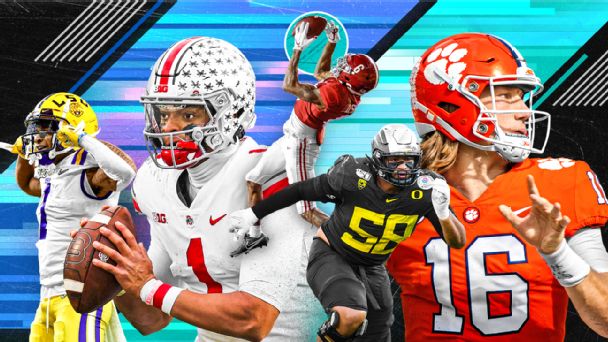ASHBURN, Va. — The Washington Football Team knows exactly what it’s getting in quarterback Ryan Fitzpatrick: a guy who can move the ball, will be fun and at times maddening, and can serve as a mentor. Fitzpatrick will also turn 39 during the season, which is why his arrival doesn’t signal the end of Washington’s quarterback search.
Fitzpatrick is what everyone thinks he is: a stopgap quarterback who can help a team win now while waiting for someone else to help later. And that player could still come through the draft.
Had Washington pursued a different quarterback — whether it be former first-round picks such as Mitchell Trubisky (Bears), Marcus Mariota (Raiders) or Sam Darnold (Jets) — it would possibly have been more tempted to see if that guy could still develop into a quality starter.
With Fitzpatrick, it’s all about his ability to help now as a player, and in the future as a mentor. That’s why it’s not out of the question Washington could take a quarterback early in the 2021 NFL draft. What round that’s in (Washington has the No. 19 overall pick), who knows?
Don’t forget: Offensive coordinator Scott Turner and general manager Martin Mayhew attended the pro day of North Dakota State’s Trey Lance last week. If they like Lance and have a chance to draft him, having Fitzpatrick plus Kyle Allen, Taylor Heinicke and Steven Montez won’t stop them.
Also, most of the quarterbacks in this draft expected to go in the first round are relatively inexperienced — Alabama’s Mac Jones has started 17 games; Lance has started 17 games and played just one this past season; Ohio State’s Justin Fields has started 22 games. But all have skills worth developing if given time.
That means not having to play those quarterbacks immediately. Having a guy like Fitzpatrick buys a young kid time, while also learning from an experienced veteran — as Tua Tagovailoa did last season in Miami. And Fitzpatrick could stick around beyond 2021 as a backup.
Had Washington waited to address the position in the draft, it would have entered the season with three young and relatively inexperienced quarterbacks plus a rookie. Yes, the team just gave Heinicke $1.5 million in guaranteed money and the coaching staff does like Allen. But there isn’t a QB about whom the team can rightly say, “This is our guy for the future.”
Until you have that player, you’re always searching for him.
Now, however, Washington has its bridge quarterback. If the team can’t draft a quarterback it likes, then it could see how Heinicke or Allen develops and then try the QB search again next offseason.

For now, Washington can rely on Fitzpatrick to push the ball down the field. It will lead to more big plays and, yes, more turnovers. But this offense needs more chunk plays, having ranked 26th in pass plays of 20 yards or more. In the past three seasons, Fitzpatrick averaged 3.25 pass plays of 20 yards or more per game — fewer than quarterbacks such as Kansas City’s Patrick Mahomes (4.26) and Tampa Bay’s Tom Brady (3.6), but more than Buffalo’s Josh Allen (3.16) and Seattle’s Russell Wilson (3.06).
Washington averaged 2.5 such plays; adding more wide receiver talent will help, but so will quarterback play. Of course, that could also result in more interceptions, something that won’t help the defense.
Like Alex Smith was for Washington’s offense, Fitzpatrick will be good for a young talent base because of his ability to spread the ball around. Washington’s offense worked best when Smith found six or seven targets per game. That’s what the coaches want. When wide receivers know they’re a possible option on any play, it keeps them engaged and running hard.
Also like Smith, Fitzpatrick is highly regarded in the locker room as a leader. With a young roster, that’s important.
But in an ideal world for Washington, Fitzpatrick helps the team win now while a young player gets ready to take over once the magic is gone.
